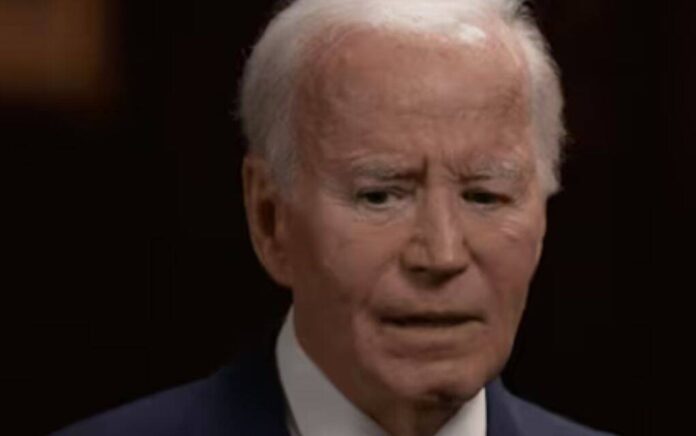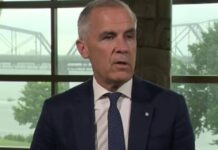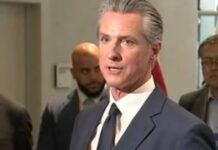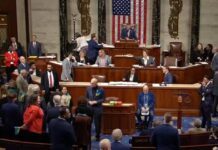
Former President Joe Biden left the White House a disgrace. Even his own Party can’t seem to forgive him.
And now Joe Biden’s broken his silence with this jaw-dropping confession in a new interview.
Biden Confesses To Having Rose-Colored Glasses Regarding His Presidency
Joe Biden’s recent interview with the BBC, his first since leaving the White House, offers a window into a presidency that seems to exist more in his mind than in the reality most Americans experienced. The former president, speaking with a tone of unwavering self-assurance, described his single term as a triumph, claiming it was “so successful on our agenda” that stepping away from the 2024 presidential race was a “hard decision.” For a man whose tenure was marked by economic turmoil, foreign policy blunders, and a crushing electoral defeat for his party, such assertions raise questions about whether Biden is rewriting history or simply refusing to see it clearly.
The decision to exit the race, Biden insisted, was not one of necessity but of reluctant choice. “Things moved so quickly that it made it difficult to walk away,” he told the BBC. “And it was a hard decision. I think it was the right decision. I think that… it was just a difficult decision.” This framing suggests a leader grappling with his own success, not one forced out by a catastrophic debate performance in July 2024 that exposed his frailty and eroded his party’s confidence. The speed of events, he implies, caught him off guard, as if the unraveling of his campaign was an external force rather than a consequence of his own limitations.
Biden’s claim that his administration’s agenda was a resounding success is a bold one, particularly when measured against the economic realities of his term. He boasted that the economy was “growing … the stock market was way up … we were expanding our influence around the world.” Yet, Americans faced inflation that soared to 9.1% in June 2022, a peak that battered household budgets and fueled widespread discontent. Energy prices, driven up by policies that curtailed domestic oil and gas production in favor of heavily subsidized green energy initiatives, added to the strain. These were not abstract statistics but daily burdens for millions, and they loomed large in voters’ minds as they headed to the polls in 2024.
The economy, unsurprisingly, was a defining issue in the election that saw Vice President Kamala Harris, Biden’s chosen successor, suffer a resounding defeat. President Donald Trump’s victory was decisive, capturing the popular vote and sweeping all seven battleground states. Biden’s assertion that Harris was a “good candidate” who was “fully funded” rings hollow in the face of such a rout. “She [Harris] was fully funded,” he reiterated, as if financial resources alone could overcome the public’s rejection of a Democratic agenda tethered to his record. The loss suggests voters saw through the rhetoric, prioritizing tangible results over campaign coffers.
Foreign policy offers another lens through which Biden’s self-assessment falters. The chaotic withdrawal from Afghanistan in August 2021 stands as a low point of his presidency, a debacle that culminated in tragedy. On Aug. 26, 2021, an ISIS-K suicide bomber struck Kabul International Airport, k*lling 13 U.S. service members and 160 civilians.
The images of desperation and loss lingered, eroding confidence in Biden’s leadership. His refusal to acknowledge these missteps in the interview, coupled with a dismissive comment about Trump’s time in office—“I’ll let history judge that… I don’t see anything that was triumphant”—suggests a selective memory that sidesteps his own administration’s failures.
Biden’s domestic agenda, particularly his aggressive push for diversity, equity, and inclusion (DEI) programs, further complicates his narrative of success. He championed embedding DEI across federal agencies, a move that sparked significant pushback. A January 2025 The Economist/YouGov poll found 45% of voters supported ending DEI programs in schools and government, with only 40% opposed. This public skepticism, paired with the administration’s relentless focus on such initiatives, hints at a disconnect between Biden’s priorities and those of the electorate. His legacy, in this regard, risks being seen as one of ideological overreach rather than practical governance.
The former president’s insistence that he was “prepared to hand this to the next generation” carries an air of magnanimity, but it glosses over the reality of his departure. His exit was not a graceful passing of the torch but a forced retreat after a debate performance that laid bare his vulnerabilities. “Um, and what happened was, I had become what we set out to do, no one thought we could do and become so successful,” Biden said, framing his withdrawal as a selfless act born of achievement. Yet, the Democratic Party’s swift pivot to Harris and her subsequent defeat suggest a party scrambling to salvage a sinking ship, not celebrating a captain’s triumphs.
Biden’s economic boasts also invite scrutiny when viewed against the lived experiences of Americans. The stock market’s gains, while real, did little to alleviate the sting of rising grocery bills, rent, and gas prices for the average family. His claim of expanding global influence is equally questionable, given the Afghanistan fiasco and strained alliances in the wake of his energy policies. These assertions, delivered with conviction, seem to prioritize narrative over evidence, a hallmark of a presidency that often struggled to align its rhetoric with reality.
The BBC interview reveals a leader who sees his tenure through a lens of unwavering optimism, even as the nation he led grappled with challenges that defined his term. Biden’s reluctance to acknowledge the weight of inflation, the Afghanistan withdrawal, or the electoral rebuke of his party suggests a disconnect that may shape how history views him. His claim that stepping down “would have mattered” little had he done so earlier dismisses the possibility that an earlier exit might have given Democrats a stronger chance to regroup and compete.
Harris’s campaign, despite Biden’s praise, struggled to overcome the baggage of his administration. The “fully funded” effort he touted failed to resonate with voters who associated her with the same policies that drove up costs and sowed distrust. Biden’s assertion that his agenda was “hard to say, now I’m going to stop now” implies a choice to step back at the height of success, but the reality is less flattering: his party and the public had already begun to move on.
Whether Joe Biden and the Democrats like it or not, the 2024 election, with its sweeping rejection of his party’s standard-bearer, speaks louder than his words, leaving a legacy that history may judge far less kindly than he hopes.
More breaking news and reports from Washington, D.C. can be found right here on the Federalist Wire.



















